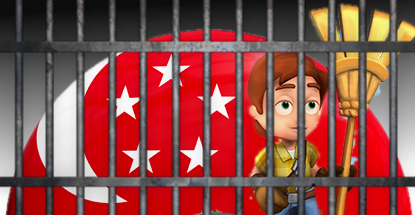 Singapore’s social gaming fans could find themselves on the outs depending on how politicians choose to interpret the city-state’s proposed online gambling bill. The Remote Gambling Bill, which was introduced into parliament last week, would criminalize all online gambling operators not holding a special exemption, which are available only to the likes of community-supporting organizations like Singapore Pools and the Singapore Turf Club.
Singapore’s social gaming fans could find themselves on the outs depending on how politicians choose to interpret the city-state’s proposed online gambling bill. The Remote Gambling Bill, which was introduced into parliament last week, would criminalize all online gambling operators not holding a special exemption, which are available only to the likes of community-supporting organizations like Singapore Pools and the Singapore Turf Club.
Trouble is, the bill’s definition of a prohibited “gambling service” applies to any “game of chance where the game is played for money or money’s worth” and for which a customer “gives or agrees to give money or money’s worth to play or enter the game.” That doesn’t bode well for social gamers, given that virtual credits used to play social games can be purchased with cash and random generators play a role in even non-casino types of social games.
Luc Delany, CEO of the UK-based International Social Games Association , expressed concern that Singapore’s bill “could outlaw the ‘freemium’-pricing model” in social games even though they have “nothing to do with real-money gambling.” Worse, since the bill also criminalizes customers who patronize unauthorized sites, Singapore’s jail could quickly fill up with Farmville players if clarity isn’t injected via a social gaming carveout.
PLUCKY JAPANESE ENTREPRENEUR ARRESTED FOR NOT GOING ON THE DOLE
Over in Japan, a Tokyo entrepreneur has been arrested for allowing his online patrons to cash out their virtual credits for real cash. On Monday, Tokyo Metropolitan Police raided a parlor in which manager Aritomo Oishi operated 14 computers connected to an international-based site offering baccarat and roulette. Asked why he’d started his journey down this particular highway to hell, Oishi didn’t mince words: “I didn’t have a job.” Well, there you are.
The Nippon News Network reported that Oishi’s customers were required to buy points with which to wager online. The points, purchased at ¥100 (US 92¢) apiece, could be converted back into cash at the end of each gambling session, much like the little silver balls of Japan’s other gaming obsession, pachinko, only Oishi was classy enough not to make you walk into a back alley to claim your winnings. Police said Oishi’s operation had generated revenue of ¥26m ($240k) since it opened in March.
